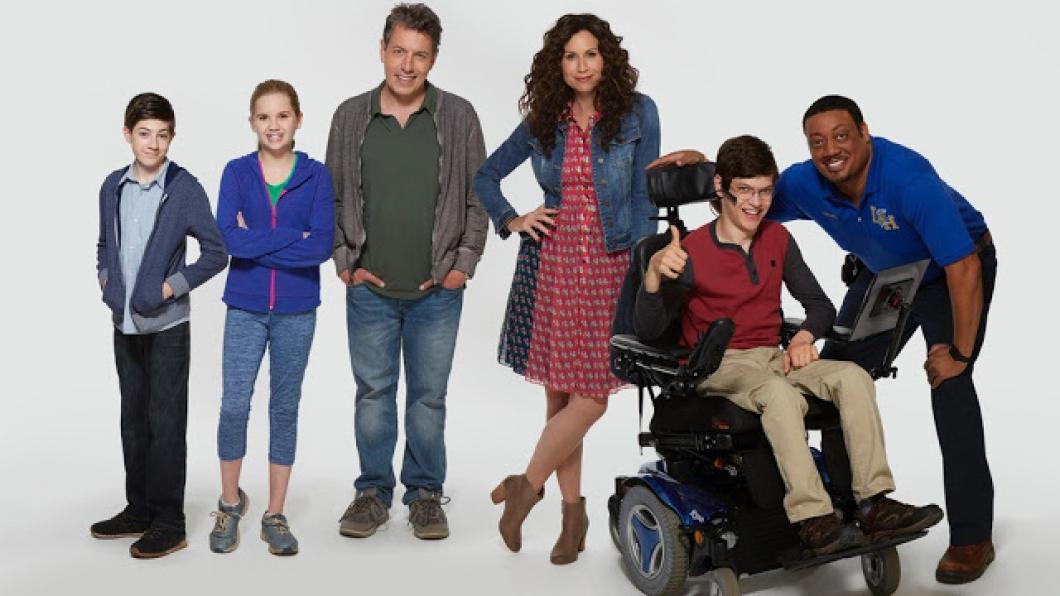
Disabled teen plays lead role without speaking? Hello 'Speechless'
By Louise Kinross
On Sunday, New York Times TV critic Neil Genzlinger wrote about "Speechless," a new ABC family comedy set to air tomorrow.
The series created a buzz in the disability community because 16-year-old JJ DiMeo, one of the main characters, has cerebral palsy and doesn't speak.
Genzlinger tells us that he understands this world personally because his daughter, who has Rett syndrome, is non-verbal.
In fact, Genzlinger says he watched the pilot episode while at Camp Communicate in Maine, which is for kids who use voice devices to communicate.
Not only is the show unique in casting a non-speaking person as a central character, but Micah Fowler, the actor playing JJ, has cerebral palsy himself.
Fowler is able to speak, but in the show he communicates by selecting letters to form words with a laser pointer attached to his glasses. A partner then reads them.
Whoa! A disabled person playing a lead role and communicating with technology that's stigmatized in the wider world? This is earth shattering.
Scientist Gail Teachman, who worked as an occupational therapist for 20 years at Holland Bloorview, has researched how people tend to exclude high school students who use voice devices. In a BLOOM article, she notes that even when a teen gets good at using a device, out in the world "People don't stop, they don't wait, and they don't value what [the person has] to say."
To cast JJ, who labours to communicate, is as bold as "television's first single mother or black lead or transgender storyline was," Genzlinger says.
Watching the pilot at his daughter's camp, Genzlinger says the consensus among staff and campers was that whoever wrote the sitcom "gets it." And apparently he does.
Creator Scott Silveri grew up with a brother who was non-verbal, Genzlinger says. He told Genzlinger he wasn't interested in a story "about" disability, but rather, about a family and the interplay among its members when one has a disability.
Authentic representation of disability on TV, the stage and in film is a hot topic.
In Los Angeles, the musical The Hunchback of Notre Dame is playing with John McGinty as the first deaf actor to portray Quasimodo, more closely resembling the deaf character in Victor Hugo's novel. For each of Quasimodo's songs, a singer joins McGinty on stage, while McGinty signs the song in American Sign Language.
"One of the things I feel very connected with is sometimes I do feel excluded, and I do feel like an outcast," McGinty says in this piece in LA Weekly. "It's one of those things of being a deaf individual in a hearing world."
McGinty says he relates to the inner world of Quasimodo, even if he doesn't have similar physical traits, such as a crooked spine.
Earlier this year, I read this fascinating piece about the movie adaptation of R. J. Palacio's bestselling book Wonder, about a 10-year-old boy born with unusual facial features. "I won't describe what I look like," he says on the first page of the book. "Whatever you're thinking, it's probably worse."
The book is a fabulous account of what it means to look different in our society, and how others come to see him.
But instead of casting a boy with a craniofacial disorder, an actor will spend hours having his face altered with makeup and prostheses, then "fake" a speech impediment.
"We are inspired by seeing real minorities on the screen, not Caucasian actors cast as ethnic characters, and not actors pretending to have a disability or physical difference," writes Cynthia Murphy, who has Treacher Collins syndrome. "We are just asking for an accurate picture of how we live on a daily basis, and to see and feel the real deal."
I couldn't have said it better.
Genzlinger in The New York Times says he hopes Speechless "breaks down the sense of isolation that envelops families like the DiMeos."
Making those families visible in an authentic way is a first, long-overdue step. We all long to see ourselves in mainstream storylines.